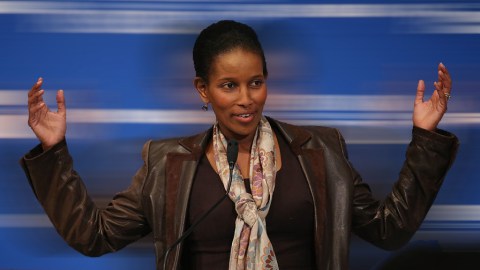These are the women behind the Intellectual Dark Web

Though yesterday’s Italian election is seen as a deadlock, the Far Right is the clear winner, with the populist Five Star Movement and anti-immigrant League coming out ahead. Even Silvio Berlusconi performed well in an election considered a rebuke to anyone with progressive ideas about the cultural and political direction of the nation. Even John Oliver’s plea to elect him as a write-in candidate didn’t help.
In America, an emergent coalition of intellectuals that span the ideological spectrum has come out in opposition to growing populist sentiments. The economist Eric Weinstein has termed this cohort of public intellectuals the “Intellectual Dark Web,” which is in part defined by their online presence, with their discourses presented through podcasts and self-funded initiatives.
This particular web is not defined by Left or Right ideologies, but rather a dedication to discussing topics the mainstream media decries or outright avoids. While recognizable names include Joe Rogan, Sam Harris, Dan Carlin, Tim Ferriss, and Dave Rubin, there are many important women occupying this space whose work is promoting dialogues about the gray spaces where many only see black and white.
Alice Dreger
Science historian and sex educator Alice Dreger’s book, Galileo’s Middle Finger, has been recommended by Steven Pinker, Jared Diamond, and Dan Savage, among others. She’s written for an incredible range of mainstream publications but it was in April 2015 that her work received widespread attention when she live-tweeted her son’s high school sex-ed class on abstinence.
“You’ll find a good girl. If you find one that says ‘no,’ that’s the one you want.” HE ACTUALLY JUST SAID THAT.
— Alice Dreger (@AliceDreger) April 15, 2015
This led to a book on teaching children proper sexual education. Though she continues to be harassed by the Right for her views on sexuality (as well as advocating against discrimination of certain body types and other physical features), Dreger continues to write and speak out against repressive ideas about the human body—and basic biology.
Heather Heying
By now the story of the evolutionary biologist Heather Heying and her husband Bret Weinstein (also an evolutionary biologist) is well known. On the Left, the extreme Alt-Right is often discussed even as the extremist contours of its own side go overlooked. Such was the case at Evergeen State College in Olympia, Washington, where protestors continually shut down events on campus. This culminated when white students and staff were asked to not show up on campus for a “Day of Absence,” a reversal of previous efforts in which protesting groups were the ones to not attend. Heying and Weinstein challenged this by attempting to employ reason and logic, and were met with near-violent opposition.
Ayaan Hirsi Ali
Somali-born Dutch-American activist Ayaan Hirsi Ali is a leading voice for the reformation of Islam. Her bestselling book chronicles her upbringing in a fundamentalist Muslim household and her escape from forced marriage to become one of the most influential people on the planet. She’s spent her entire life being threatened by hardcore religionists as well as, more recently, the Left—the Southern Poverty Law Center labeled her an “anti-Muslim extremist,” equating her with vitriolic figures like Pamela Geller and Robert Spencer. She continues to be an advocate for women’s rights in Islam as well as a rethinking of the religion in general.
Claire Lehmann
Australian writer Claire Lehmann founded the online magazine Quillette as a forum for free thought, in the belief that “free expression and the free exchange of ideas help human societies flourish and progress.” Lehmann is an example of the power of crowdfunding as her site is predominantly sponsored through its Patreon page. The site is now expanding beyond the digital world for its Quillette Circle initiative, an international meet-up effort that creates an environment for participants to discuss topics featured on the website. She started Quillette as a response to not being published by Australian press for her pieces that were critical of feminism.
Camille Paglia
As with Claire Lehmann, Camille Paglia has received her fair share of controversy for being critical of feminist ideas. A professor at the University of the Arts in Philadelphia, she recently summed up her ideas on the #MeToo movement: “My philosophy of equity feminism demands removal of all barriers to women’s advancement in the political and professional realms. However, I oppose special protections for women in the workplace. Treating women as more vulnerable, virtuous or credible than men is reactionary, regressive and ultimately counterproductive.”
Lindsay Shepherd
While searching for videos of the above thought leaders, I kept noticing most had been interviewed by Jordan Peterson. In 2017, Lindsay Shepherd used a three-minute recording of a debate on the usage of gender-neutral pronouns Peterson was involved in at Wilfrid Laurier University, where she was a teaching assistant. The incident (which you can listen to here) has turned Shepherd into an advocate for free speech in a world governed by narrow definitions of political correctness.
--
Derek Beres is the author of Whole Motion and creator of Clarity: Anxiety Reduction for Optimal Health. Based in Los Angeles, he is working on a new book about spiritual consumerism. Stay in touch on Facebook and Twitter.




